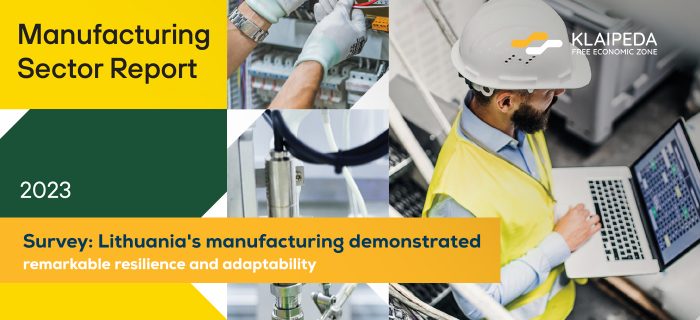News & Events
Watch our activity in one place
Lithuania maintains its top 3 position in EU for FDI jobs per capita

The latest manufacturing sector report by Invest Lithuania states that even in the face of turbulent global markets in 2022, Lithuania continued to gather recognition for its performance in attracting FDI. Last year, Lithuania was rated 1st in the EU for FDI based on Greenfield FDI performance index, the country retained its 3rd place in Europe for FDI jobs per capita, and the Lithuanian manufacturing sector demonstrated overall resilience and adaptability. Also, almost 70% of companies operating in Lithuania plan to introduce new manufacturing functions or significantly expand existing ones.
Over the past several years, the manufacturing industry experienced multiple shocks, from the Covid-19 pandemic forcing manufacturing plants to suspend operations, to semiconductor shortages that led to certain industry disruptions, to lastly having to adapt to the sharply increased energy prices in continental Europe in the wake of the Russian invasion of Ukraine in February 2022. These shocks had a profound impact on FDI, the survey states.
Lithuania however has managed to maintain a steady third place across all EU members in terms of new jobs created per 1M inhabitants throughout both the pre-pandemic and postpandemic periods, only being surpassed by Slovakia and Hungary. Interestingly, in the midst of the Covid-19 pandemic in 2020, Lithuania created the most jobs per 1M inhabitants in the entire EU (600 FTEs).
Also, Lithuania was the 3rd in Europe in terms of CAPEX investments, experiencing an average 22% increase during pre-pandemic and post-pandemic periods. Lithuania’s CAPEX investments per project increased by 124%, much faster than both in the EU and the CEE. One potential explanation for the decreasing number of workers and increasing capital expenditure investments could be that in the post-pandemic period companies are keener to invest in automatization, resulting in more capital-intensive projects with lower employee requirements.
The Invest Lithuania report also surveyed 62 foreign manufacturing companies operating in Lithuania from a variety of sectors. The survey saw continued evidence of the positive trend of companies pursuing expansion projects. Almost 68% of the companies surveyed are planning to introduce new functions or significantly expand existing ones in 2023-2024, with 66% planning to expand production, 13% engineering, and another 10% R&D functions. Despite concerns over the global economic situation and geopolitics, 23% of the companies are planning to expand two or more of their functions in Lithuania in the following year.
To support this growth, respondents indicated that they are, on average, expecting to hire 46 FTEs within 2023. Again, it’s an increase on the previous year, when companies indicated plans to hire 32 FTEs, on average. During 2023, 77% of the companies are planning to hire new employees. More than a third of the respondents are planning to hire at least 30 FTEs, with eight companies planning to increase their workforce by more than 100 FTEs over the following year.
Lithuania’s talent pool has displayed remarkable adaptability and resilience against such a tumultuous backdrop. In 2022, Lithuania placed third in CEE for attracting and retaining talent. The survey findings also show that voluntary attrition rates at foreign companies remained rather stable at 19%, displaying only a 1% increase compared to the year before. Meanwhile, the overall attrition rate in Lithuania remained at around 30%. This is unsurprising as foreign companies operating in Lithuania have a successful track record of attracting and retaining great talent.
The survey results show that cooperation between foreign investors and local educational institutions remains high, with approximately half of the companies surveyed reporting that they worked together with universities/colleges and/or vocational schools on a regular basis. Not only that, the majority of these companies (67%) chose to cooperate with more than one institution.
Although cooperation with educational institutions is common in Lithuania, not all foreign companies choose to go down this route. For the majority of those who do not cooperate (40%), the reasoning is quite simple – they do not require it. For others, the rationale is more complex – some companies lack the information needed to take advantage of such partnerships, or it may be that there are no suitable educational institutions to collaborate with.
Regardless of whether a company cooperates with an educational institution or not, the main method of upskilling people was found to be internal training. A staggering 82% of surveyed companies chose to educate people within the organization and are planning to continue doing so in 2023. In general, the survey findings show that 92% of manufacturing companies have some type of employee training. This is not surprising, especially considering that, with the rise of manufacturing 4.0, the workforce is facing an increasing need to strengthen their digital and technical skills.
Klaipėda is listed in the Invest Lithuania study as a city with key competencies in port engineering, metals, plastics and the food industry. Last year, the port city employed almost 29,000 people in manufacturing – a larger proportion than in Kaunas or Vilnius. Unemployment in Klaipėda was 5.9% last year, slightly higher than in Kaunas or Vilnius, but lower than in the other main cities of the country. Also, almost 11,000 students started their studies in Klaipėda at the start of the school year in 2022.
The Invest Lithuania survey also explored areas such as supply chain disruptions and companies’ response, diversity and inclusion, hiring times, non-salary benefits, energy sustainability, CSR and real estate. You can download the report here.
